Weight Management Beverages Market
Weight Management Beverages Market Size and Share Forecast Outlook 2025 to 2035
Weight management beverages market is projected to grow from USD 4.4 billion in 2025 to USD 8.3 billion by 2035, at a CAGR of 6.6%. Protein-based RTD will dominate with a 47.0% market share, while low-calorie will lead the by claim segment with a 52.0% share.
Weight Management Beverages Market Forecast and Outlook 2025 to 2035
The global weight management beverages market is projected to grow from USD 4.4 billion in 2025 to approximately USD 8.3 billion by 2035, recording an absolute increase of USD 3.9 billion over the forecast period. This translates into a total growth of 88.6%, with the market forecast to expand at a CAGR of 6.6% between 2025 and 2035. The overall market size is expected to grow by nearly 1.9 times during the same period, supported by increasing global health consciousness, growing adoption of protein-based nutrition solutions in lifestyle management, and rising obesity awareness driving premium weight management beverage procurement across various consumer segments.
Quick Stats for Weight Management Beverages Market
| Weight Management Beverages Market Value (2025) | USD 4.4 billion |
|---|---|
| Weight Management Beverages Market Forecast Value (2035) | USD 8.3 billion |
| Weight Management Beverages Market CAGR | 6.6% |
| Leading Segment by Type (2025) | Protein-based RTD (47.0%) |
| Leading Segment by Claim (2025) | Low-calorie (52.0%) |
| Leading Segment by Channel (2025) | Retail (58.0%) |
| Key Growth Regions | North America, Europe, and Asia Pacific |
| Top Companies by Market Share | Nestlé, Herbalife, Abbott |
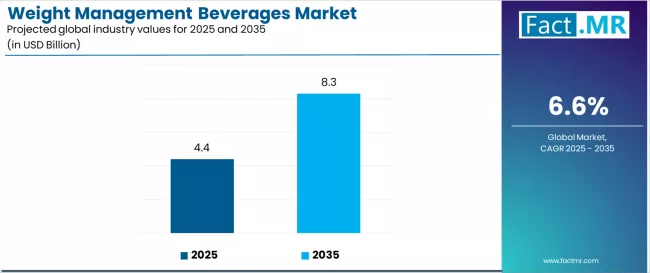
Weight Management Beverages Market Key Takeaways
| Metric | Value |
|---|---|
| Market Value (2025) | USD 4.4 billion |
| Market Forecast Value (2035) | USD 8.3 billion |
| Forecast CAGR (2025-2035) | 6.6% |
Why is the Weight Management Beverages Market Growing?
| HEALTH & WELLNESS TRENDS | LIFESTYLE MANAGEMENT REQUIREMENTS | REGULATORY & QUALITY STANDARDS |
|---|---|---|
| Global Obesity Awareness Growth | Sophisticated Nutrition Requirements | Food Safety Standards |
| Continuous expansion of obesity awareness across established and emerging markets driving demand for effective weight management solutions. | Modern lifestyle management requires convenient beverages delivering precise nutritional control and enhanced satiety benefits. | Regulatory requirements establishing performance benchmarks favoring high-quality nutritional beverage systems. |
| Protein-Based Nutrition Recognition | Convenience Demands | Nutritional Labeling Standards |
| Growing focus on protein importance in weight management and muscle maintenance creating demand for protein-enriched beverages. | Consumers investing in convenient nutrition solutions offering consistent performance while maintaining busy lifestyle compatibility. | Quality standards requiring superior nutritional profiles and accurate ingredient declarations in weight management products. |
| Premium Health Positioning | Quality and Efficacy Standards | Health Claim Compliance Requirements |
| Superior satiety enhancement and metabolic support characteristics making weight management beverages essential for health-focused consumers. | Certified manufacturers with proven track records required for advanced nutritional beverage applications. | Diverse regulatory requirements and health claim standards driving need for scientifically-backed weight management solutions. |
Weight Management Beverages Market Segmentation
| Category | Segments Covered |
|---|---|
| By Type | Protein-based RTD, Meal-replacement shakes, Functional teas/Others |
| By Claim | Low-calorie, Keto/low-carb, High-protein |
| By Channel | Retail, Direct-to-consumer, Clinically prescribed |
| By Region | North America, Europe, Asia Pacific, Latin America, Middle East & Africa |
Weight Management Beverages Market Analysis by Type
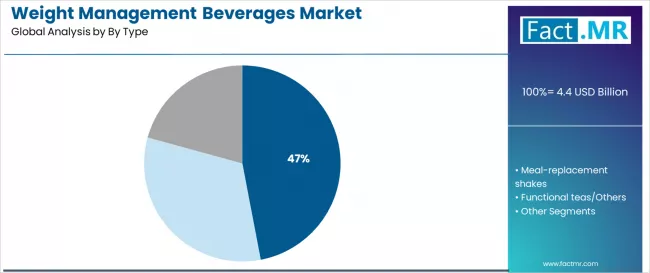
| Segment | 2025 to 2035 Outlook |
|---|---|
| Protein-based RTD | Leader in 2025 with 47.0% market share; likely to maintain leadership through 2035. Superior convenience factor, proven satiety benefits, and established consumer acceptance across fitness and weight management segments. Momentum: strong growth driven by fitness culture expansion and busy lifestyle trends. Watchouts: ingredient cost inflation, taste optimization challenges. |
| Meal-replacement shakes | Strong segment with 34.0% share due to comprehensive nutrition profiles and structured weight loss program integration. Benefits from clinical validation and professional endorsement in weight management protocols. Momentum: steady growth through 2030, supported by medical weight management programs and structured diet approaches. Watchouts: regulatory scrutiny, consumer preference for whole foods. |
| Functional teas/Others | Represents 19.0% market share, encompassing detox teas, metabolism boosters, and specialty functional beverages with weight management claims. Growing interest in natural and traditional approaches to weight management. Momentum: selective growth in natural wellness and traditional medicine segments. Innovation-dependent with varying efficacy claims and regulatory challenges. |
Weight Management Beverages Market Analysis by Claim
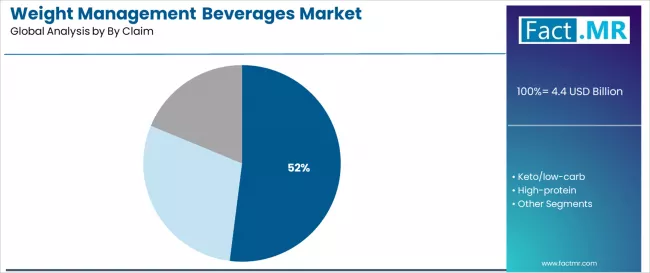
| Segment | 2025 to 2035 Outlook |
|---|---|
| Low-calorie | Dominant segment with 52.0% market share due to fundamental weight management positioning and broad consumer appeal. Established regulatory framework and proven market acceptance across demographics. Momentum: steady growth driven by calorie-conscious consumers and weight loss programs. Watchouts: artificial sweetener concerns, taste compromise challenges. |
| Keto/low-carb | Strong segment with 28.0% share, benefiting from ketogenic diet trends and low-carb lifestyle adoption. Premium positioning with specialized nutritional profiles for metabolic optimization. Momentum: rising rapidly via diet trend adoption and metabolic health awareness. Watchouts: diet trend volatility, long-term sustainability questions. |
| High-protein | Holds 20.0% share, focused on muscle maintenance during weight loss and satiety enhancement through protein content. Strong in fitness and active lifestyle segments requiring protein supplementation. Momentum: moderate growth via fitness culture and active aging trends. Innovation-dependent with protein source diversification and digestibility optimization. |
Weight Management Beverages Market Analysis by Channel
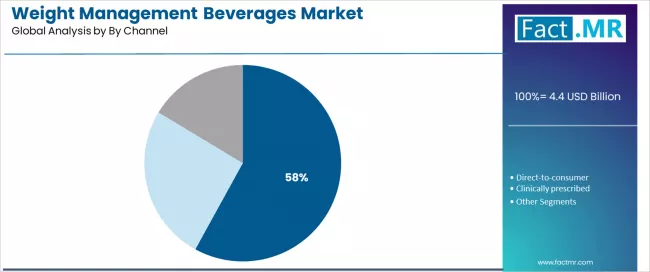
| Segment | 2025 to 2035 Outlook |
|---|---|
| Retail | Dominant segment with 58.0% market share, encompassing supermarkets, health stores, and specialty nutrition retailers providing convenient access to weight management beverages. Established distribution networks and consumer shopping patterns. Momentum: steady growth driven by retail expansion and product visibility. Watchouts: shelf space competition, margin pressure from retailers. |
| Direct-to-consumer | Growing segment with 27.0% share driven by subscription models and personalized nutrition programs. Benefits from higher margins and direct customer relationships with customization capabilities. Momentum: strong growth through 2030, supported by e-commerce expansion and personalized nutrition trends. Watchouts: customer acquisition costs, subscription model sustainability. |
| Clinically prescribed | Specialized segment with 15.0% share, focused on medical weight management programs and healthcare provider recommendations. Premium positioning with clinical validation and professional oversight. Momentum: selective growth in medical weight management and obesity treatment programs. Innovation-dependent with clinical evidence requirements and regulatory compliance. |
DRIVERS
| DRIVERS | RESTRAINTS | KEY TRENDS |
|---|---|---|
| Global Health Consciousness Growth | Taste and Palatability Challenges | Personalized Nutrition Technologies |
| Continuing expansion of health awareness across established and emerging markets driving demand for convenient weight management solutions. | Consumer acceptance challenges related to taste, texture, and palatability affecting product adoption and repeat purchase rates. | Integration of genetic testing, metabolic profiling, and customized formulation systems enabling superior personalization and efficacy. |
| Obesity Epidemic Recognition | Regulatory Complexity | Plant-Based Protein Innovation |
| Increasing recognition of obesity as a global health crisis driving demand for effective and accessible weight management tools. | Complex regulatory requirements for health claims and weight management products affecting product development and marketing approaches. | Enhanced plant-based protein sources, sustainable formulations, and allergen-free options compared to traditional protein systems. |
| Premium Convenience Positioning | Market Saturation Concerns | Digital Health Integration |
| Growing demand for beverages that support both weight management goals and busy lifestyle requirements in modern consumer behavior. | Increasing market saturation in developed regions and intense competition affecting pricing and differentiation strategies. | Development of app-connected products, progress tracking, and digital coaching integration providing enhanced user engagement opportunities. |
Analysis of Weight Management Beverages Market by Key Countries
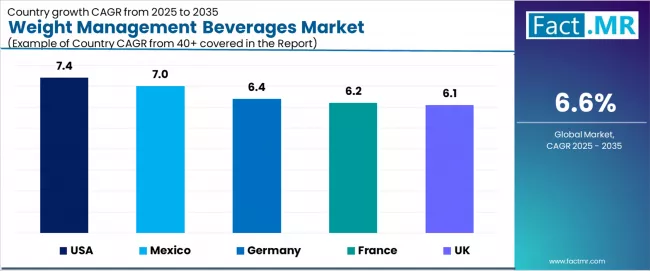
| Country | CAGR (2025-2035) |
|---|---|
| USA | 7.4% |
| Germany | 6.4% |
| France | 6.2% |
| Mexico | 7.0% |
| UK | 6.1% |
USA Leads Global Market Growth with Health Innovation Excellence
The USA is projected to exhibit strong growth with a market value of USD 2.8 billion by 2035, driven by expanding health and wellness industry infrastructure and comprehensive obesity management creating substantial opportunities for beverage suppliers across retail operations, direct-to-consumer platforms, and clinical weight management sectors. The country's established fitness culture and expanding personalized nutrition capabilities are creating significant demand for both protein-based and specialized weight management beverages. Major nutrition companies and beverage manufacturers including Nestlé, Herbalife, and fitness specialists are establishing comprehensive distribution networks to support large-scale consumer operations and meet growing demand for convenient weight management solutions.
- Health and wellness industry modernization programs are supporting widespread adoption of advanced weight management beverage systems across retail operations, driving demand for high-quality nutritional products
- Obesity management initiatives and fitness culture development are creating substantial opportunities for beverage suppliers requiring proven efficacy and consumer appeal solutions
- Personalized nutrition advancement and digital health programs are facilitating adoption of specialized weight management technologies throughout major consumer markets
Germany Demonstrates Strong Market Potential with Wellness Innovation Growth
Germany is expanding to reach USD 1.2 billion by 2035, supported by extensive health industry modernization and comprehensive wellness development creating steady demand for reliable weight management solutions across diverse consumer categories and specialty health segments. The country's advanced nutrition science position and expanding health-conscious demographics are driving demand for beverage solutions that provide consistent efficacy while supporting comprehensive wellness requirements. Beverage manufacturers and nutrition suppliers are investing in local research facilities to support growing consumer operations and wellness innovation demand.
- Wellness industry operations expansion and health-conscious demographic development are creating opportunities for weight management solutions across diverse consumer segments requiring reliable efficacy and comprehensive nutrition profiles
- Health technology modernization and nutrition advancement are driving investments in beverage supply chains supporting weight management requirements throughout major consumer regions
- Research and development programs for nutrition innovation are enhancing demand for precision-grade weight management systems throughout German consumer markets
France Maintains Leadership with Nutrition Technology Innovation
France is projected to reach USD 945.0 million by 2035, supported by the country's leadership in nutrition technology and advanced wellness systems requiring sophisticated weight management beverages for comprehensive health management and lifestyle applications. French consumers are adopting high-quality beverage systems that support advanced nutrition protocols, lifestyle efficiency, and comprehensive wellness standards. The market is characterized by focus on natural ingredients, eco-friendly practices, and compliance with stringent food quality and health standards.
- Advanced nutrition industry investments are prioritizing proven weight management technologies that demonstrate superior efficacy and sustainability while meeting French food quality and wellness standards
- Nutrition technology leadership programs and wellness excellence initiatives are driving adoption of precision-engineered beverage systems that support advanced consumer requirements and health optimization
- Research and development programs for wellness advancement are facilitating adoption of specialized weight management technologies throughout major consumer centers
Mexico Expands Market with Health Awareness Development
Mexico is growing to reach USD 715.0 million by 2035, driven by health awareness development programs and increasing nutrition modernization creating steady opportunities for beverage suppliers serving both urban consumer markets and emerging health-conscious demographics. The country's expanding middle class and growing obesity awareness are creating demand for weight management solutions that support diverse consumer needs while maintaining affordable accessibility standards. Beverage manufacturers and nutrition distributors are developing market strategies to support consumer accessibility and product quality.
- Health awareness development programs and nutrition modernization are facilitating adoption of weight management solutions capable of supporting diverse consumer requirements and accessible pricing standards
- Obesity awareness growth and lifestyle modernization programs are enhancing demand for weight management beverages that support health effectiveness and consumer accessibility
- Consumer market development initiatives and nutrition adoption programs are creating opportunities for advanced weight management capabilities across Mexican consumer markets
UK Focuses on Premium Wellness Solutions
The UK is projected to reach USD 625.0 million by 2035, expanding at a CAGR of 6.1%, driven by premium wellness excellence and specialized nutrition capabilities supporting comprehensive health management and consumer applications. The country's established wellness innovation tradition and growing premium health market segments are creating demand for high-quality weight management solutions that support consumer performance and wellness standards. Beverage manufacturers and nutrition suppliers are maintaining comprehensive development capabilities to support diverse consumer wellness requirements.
- Premium wellness programs and specialized nutrition systems are supporting demand for high-performance beverages that meet contemporary efficacy and quality standards
- Health innovation and weight management programs are creating opportunities for specialized beverage solutions that provide comprehensive wellness support
- Nutrition innovation and product quality enhancement programs are facilitating adoption of advanced weight management capabilities throughout major consumer regions
Europe Market Split by Country
The weight management beverages market in Europe is projected to grow from USD 1.3 billion in 2025 to USD 2.2 billion by 2035, registering a CAGR of 5.9% over the forecast period. Germany is expected to maintain its leadership position with a 29.8% market share in 2025, supported by its advanced nutrition industry and health-conscious consumer base including major wellness retailers and specialized health food channels.
France follows with a 23.1% share in 2025, projected to reach 23.6% by 2035, driven by comprehensive wellness programs and premium nutrition initiatives. The United Kingdom holds a 18.7% share in 2025, expected to maintain 18.3% by 2035 despite post-Brexit supply chain adjustments. Italy commands a 14.2% share, while Spain accounts for 10.4% in 2025. The Rest of Europe region is anticipated to gain momentum, expanding its collective share from 3.8% to 4.6% by 2035, attributed to increasing health awareness in Nordic countries and emerging Eastern European consumer markets implementing wellness and weight management programs.
Premium Quality Standards Define Japanese Market Dynamics
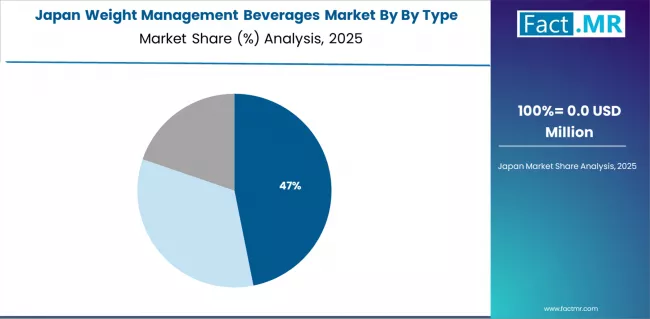
Japanese weight management beverages operations reflect the country's exacting quality standards and sophisticated consumer requirements. Major food and beverage companies maintain rigorous product development processes that often exceed international standards, requiring extensive taste testing, nutritional validation, and consumer acceptance studies that can take 12-18 months to complete. This creates high barriers for new suppliers but ensures consistent quality that supports premium consumer positioning.
The Japanese market demonstrates unique formulation requirements, with significant demand for ultra-precise nutritional specifications tailored to Japanese dietary preferences and health consciousness patterns. Companies require specific taste profiles and functional benefits that may differ from Western consumer preferences, driving demand for specialized product development capabilities.
Regulatory oversight through the Ministry of Health, Labour and Welfare emphasizes comprehensive safety management and health claim validation that surpass most international standards. The functional food approval system requires detailed clinical evidence and safety documentation, creating advantages for suppliers with robust research capabilities and comprehensive regulatory compliance.
Consumer engagement focuses on long-term brand relationships rather than purely transactional purchasing patterns. Japanese consumers typically maintain brand loyalty spanning years, with product selection focusing quality consistency over price considerations. This stability supports investment in specialized weight management formulations tailored to Japanese consumer preferences.
Market Dynamics Drive Innovation in South Korea
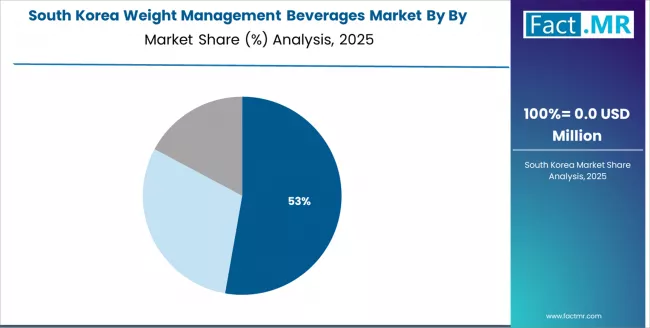
South Korean weight management beverages operations reflect the country's advanced consumer market and technology-oriented lifestyle model. Major food and beverage companies drive sophisticated product development strategies, establishing direct relationships with global suppliers to secure consistent quality and innovation for their health-focused operations targeting both domestic consumers and wellness export markets.
The Korean market demonstrates particular strength in applying advanced nutrition technologies to weight management applications, with companies integrating functional ingredients and innovative delivery systems into products designed for busy urban lifestyles. This technological focus creates demand for specific product specifications that often exceed standard formulations, requiring suppliers to adapt nutritional profiles and convenience features.
Regulatory frameworks emphasize consumer safety and product innovation, with Korean Food and Drug Administration requirements often exceeding international benchmarks. This creates barriers for lower-quality suppliers but benefits established manufacturers who can demonstrate advanced capabilities. The regulatory environment particularly favors suppliers with functional ingredient validation and comprehensive safety documentation.
Consumer market efficiency remains critical given Korea's focus on lifestyle innovation and wellness trends. Companies increasingly pursue long-term contracts with suppliers in North America and Europe to ensure reliable access to high-quality ingredients while managing innovation transfer requirements. Advanced distribution investments support product preservation during international shipping and consumer education requirements.
Competitive Landscape of Weight Management Beverages Market
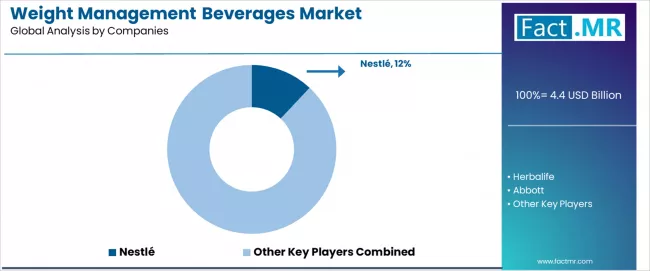
Profit pools are consolidating upstream in scaled nutrition manufacturing systems and downstream in specialized weight management solutions for retail, direct-to-consumer, and clinical applications. Value is migrating from basic beverage manufacturing to specification-tight, clinically-validated products where efficacy claims, taste optimization, and consumer appeal command premiums. Several archetypes set the pace: global nutrition giants defending share through brand recognition and distribution scale; specialized weight management companies that focus on comprehensive lifestyle solutions; protein innovation leaders with advanced formulation IP and fitness industry connections; and direct-to-consumer disruptors pulling volume in personalized nutrition and subscription models.
Switching costs, taste preference, routine integration, subscription commitments, stabilize pricing for incumbents, while regulatory changes (health claim restrictions, labeling requirements, ingredient approvals) and lifestyle trend shifts reopen share for innovative product developers. Consolidation and vertical integration continue; direct-to-consumer channels grow rapidly as retail presence remains relationship-dependent. Market dynamics favor suppliers with comprehensive consumer insights, regulatory expertise, and established distribution networks.
The competitive environment presents both opportunities and constraints. Advanced efficacy requirements create barriers for generic beverage producers but establish performance standards that favor established nutrition companies over commodity manufacturers. Market consolidation accelerates as companies seek economies of scale to absorb rising ingredient costs and consumer acquisition expenses.
| Stakeholder Type | Primary Advantage | Repeatable Plays |
|---|---|---|
| Global nutrition giants | Scale, brand recognition, distribution networks | Long-term retail partnerships, proven formulations, marketing expertise |
| Weight management specialists | Category focus, clinical validation | Specialized programs, healthcare partnerships, efficacy positioning |
| Protein innovation leaders | Advanced formulation IP and fitness connections | Sports nutrition expertise, ingredient innovation, performance positioning |
| Direct-to-consumer disruptors | Personalization and subscription models | Digital marketing, customized nutrition, direct relationships |
Key Players in the Weight Management Beverages Market
- Nestlé
- Herbalife
- Abbott
- Glanbia
- SlimFast
- Atkins
- Huel
- Premier Protein
- IdealShape
- Garden of Life
Scope of the Report
| Items | Values |
|---|---|
| Quantitative Units | USD 4.4 billion |
| Product | Protein-based RTD, Meal-replacement shakes, Functional teas/Others |
| Claim | Low-calorie, Keto/low-carb, High-protein |
| Regions Covered | North America, Latin America, Europe, Asia Pacific, Middle East & Africa |
| Country Covered | United States, Germany, France, Mexico, UK, and other 40+ countries |
| Key Companies Profiled | Nestlé, Herbalife, Abbott, Glanbia, SlimFast, Atkins, Huel, Premier Protein, IdealShape, Garden of Life |
| Additional Attributes | Dollar sales by type/claim/channel, regional demand (NA, EU, APAC), competitive landscape, personalized nutrition adoption, wellness innovation, and digital health integration technologies driving consumer engagement, efficacy optimization, and lifestyle integration |
Weight Management Beverages Market Segmentation
-
By Type :
- Protein-based RTD
- Meal-replacement shakes
- Functional teas/Others
-
By Claim :
- Low-calorie
- Keto/low-carb
- High-protein
-
By Channel :
- Retail
- Direct-to-consumer
- Clinically prescribed
-
By Region :
- North America
- Europe
- Asia Pacific
- Latin America
- Middle East & Africa
Table of Content
- Executive Summary
- Global Market Outlook
- Demand to side Trends
- Supply to side Trends
- Technology Roadmap Analysis
- Analysis and Recommendations
- Market Overview
- Market Coverage / Taxonomy
- Market Definition / Scope / Limitations
- Market Background
- Market Dynamics
- Drivers
- Restraints
- Opportunity
- Trends
- Scenario Forecast
- Demand in Optimistic Scenario
- Demand in Likely Scenario
- Demand in Conservative Scenario
- Opportunity Map Analysis
- Product Life Cycle Analysis
- Supply Chain Analysis
- Investment Feasibility Matrix
- Value Chain Analysis
- PESTLE and Porter’s Analysis
- Regulatory Landscape
- Regional Parent Market Outlook
- Production and Consumption Statistics
- Import and Export Statistics
- Market Dynamics
- Global Market Analysis 2020 to 2024 and Forecast, 2025 to 2035
- Historical Market Size Value (USD Million) Analysis, 2020 to 2024
- Current and Future Market Size Value (USD Million) Projections, 2025 to 2035
- Y to o to Y Growth Trend Analysis
- Absolute $ Opportunity Analysis
- Global Market Pricing Analysis 2020 to 2024 and Forecast 2025 to 2035
- Global Market Analysis 2020 to 2024 and Forecast 2025 to 2035, By By Type
- Introduction / Key Findings
- Historical Market Size Value (USD Million) Analysis By By Type , 2020 to 2024
- Current and Future Market Size Value (USD Million) Analysis and Forecast By By Type , 2025 to 2035
- Protein-based RTD
- Meal-replacement shakes
- Functional teas/Others
- Y to o to Y Growth Trend Analysis By By Type , 2020 to 2024
- Absolute $ Opportunity Analysis By By Type , 2025 to 2035
- Global Market Analysis 2020 to 2024 and Forecast 2025 to 2035, By By Claim
- Introduction / Key Findings
- Historical Market Size Value (USD Million) Analysis By By Claim, 2020 to 2024
- Current and Future Market Size Value (USD Million) Analysis and Forecast By By Claim, 2025 to 2035
- Low-calorie
- Keto/low-carb
- High-protein
- Y to o to Y Growth Trend Analysis By By Claim, 2020 to 2024
- Absolute $ Opportunity Analysis By By Claim, 2025 to 2035
- Global Market Analysis 2020 to 2024 and Forecast 2025 to 2035, By By Channel
- Introduction / Key Findings
- Historical Market Size Value (USD Million) Analysis By By Channel, 2020 to 2024
- Current and Future Market Size Value (USD Million) Analysis and Forecast By By Channel, 2025 to 2035
- Retail
- Direct-to-consumer
- Clinically prescribed
- Y to o to Y Growth Trend Analysis By By Channel, 2020 to 2024
- Absolute $ Opportunity Analysis By By Channel, 2025 to 2035
- Global Market Analysis 2020 to 2024 and Forecast 2025 to 2035, By Region
- Introduction
- Historical Market Size Value (USD Million) Analysis By Region, 2020 to 2024
- Current Market Size Value (USD Million) Analysis and Forecast By Region, 2025 to 2035
- North America
- Latin America
- Western Europe
- Eastern Europe
- East Asia
- South Asia and Pacific
- Middle East & Africa
- Market Attractiveness Analysis By Region
- North America Market Analysis 2020 to 2024 and Forecast 2025 to 2035, By Country
- Historical Market Size Value (USD Million) Trend Analysis By Market Taxonomy, 2020 to 2024
- Market Size Value (USD Million) Forecast By Market Taxonomy, 2025 to 2035
- By Country
- USA
- Canada
- Mexico
- By By Type
- By By Claim
- By By Channel
- By Country
- Market Attractiveness Analysis
- By Country
- By By Type
- By By Claim
- By By Channel
- Key Takeaways
- Latin America Market Analysis 2020 to 2024 and Forecast 2025 to 2035, By Country
- Historical Market Size Value (USD Million) Trend Analysis By Market Taxonomy, 2020 to 2024
- Market Size Value (USD Million) Forecast By Market Taxonomy, 2025 to 2035
- By Country
- Brazil
- Chile
- Rest of Latin America
- By By Type
- By By Claim
- By By Channel
- By Country
- Market Attractiveness Analysis
- By Country
- By By Type
- By By Claim
- By By Channel
- Key Takeaways
- Western Europe Market Analysis 2020 to 2024 and Forecast 2025 to 2035, By Country
- Historical Market Size Value (USD Million) Trend Analysis By Market Taxonomy, 2020 to 2024
- Market Size Value (USD Million) Forecast By Market Taxonomy, 2025 to 2035
- By Country
- Germany
- UK
- Italy
- Spain
- France
- Nordic
- BENELUX
- Rest of Western Europe
- By By Type
- By By Claim
- By By Channel
- By Country
- Market Attractiveness Analysis
- By Country
- By By Type
- By By Claim
- By By Channel
- Key Takeaways
- Eastern Europe Market Analysis 2020 to 2024 and Forecast 2025 to 2035, By Country
- Historical Market Size Value (USD Million) Trend Analysis By Market Taxonomy, 2020 to 2024
- Market Size Value (USD Million) Forecast By Market Taxonomy, 2025 to 2035
- By Country
- Russia
- Poland
- Hungary
- Balkan & Baltic
- Rest of Eastern Europe
- By By Type
- By By Claim
- By By Channel
- By Country
- Market Attractiveness Analysis
- By Country
- By By Type
- By By Claim
- By By Channel
- Key Takeaways
- East Asia Market Analysis 2020 to 2024 and Forecast 2025 to 2035, By Country
- Historical Market Size Value (USD Million) Trend Analysis By Market Taxonomy, 2020 to 2024
- Market Size Value (USD Million) Forecast By Market Taxonomy, 2025 to 2035
- By Country
- China
- Japan
- South Korea
- By By Type
- By By Claim
- By By Channel
- By Country
- Market Attractiveness Analysis
- By Country
- By By Type
- By By Claim
- By By Channel
- Key Takeaways
- South Asia and Pacific Market Analysis 2020 to 2024 and Forecast 2025 to 2035, By Country
- Historical Market Size Value (USD Million) Trend Analysis By Market Taxonomy, 2020 to 2024
- Market Size Value (USD Million) Forecast By Market Taxonomy, 2025 to 2035
- By Country
- India
- ASEAN
- Australia & New Zealand
- Rest of South Asia and Pacific
- By By Type
- By By Claim
- By By Channel
- By Country
- Market Attractiveness Analysis
- By Country
- By By Type
- By By Claim
- By By Channel
- Key Takeaways
- Middle East & Africa Market Analysis 2020 to 2024 and Forecast 2025 to 2035, By Country
- Historical Market Size Value (USD Million) Trend Analysis By Market Taxonomy, 2020 to 2024
- Market Size Value (USD Million) Forecast By Market Taxonomy, 2025 to 2035
- By Country
- Kingdom of Saudi Arabia
- Other GCC Countries
- Turkiye
- South Africa
- Other African Union
- Rest of Middle East & Africa
- By By Type
- By By Claim
- By By Channel
- By Country
- Market Attractiveness Analysis
- By Country
- By By Type
- By By Claim
- By By Channel
- Key Takeaways
- Key Countries Market Analysis
- USA
- Pricing Analysis
- Market Share Analysis, 2024
- By By Type
- By By Claim
- By By Channel
- Canada
- Pricing Analysis
- Market Share Analysis, 2024
- By By Type
- By By Claim
- By By Channel
- Mexico
- Pricing Analysis
- Market Share Analysis, 2024
- By By Type
- By By Claim
- By By Channel
- Brazil
- Pricing Analysis
- Market Share Analysis, 2024
- By By Type
- By By Claim
- By By Channel
- Chile
- Pricing Analysis
- Market Share Analysis, 2024
- By By Type
- By By Claim
- By By Channel
- Germany
- Pricing Analysis
- Market Share Analysis, 2024
- By By Type
- By By Claim
- By By Channel
- UK
- Pricing Analysis
- Market Share Analysis, 2024
- By By Type
- By By Claim
- By By Channel
- Italy
- Pricing Analysis
- Market Share Analysis, 2024
- By By Type
- By By Claim
- By By Channel
- Spain
- Pricing Analysis
- Market Share Analysis, 2024
- By By Type
- By By Claim
- By By Channel
- France
- Pricing Analysis
- Market Share Analysis, 2024
- By By Type
- By By Claim
- By By Channel
- India
- Pricing Analysis
- Market Share Analysis, 2024
- By By Type
- By By Claim
- By By Channel
- ASEAN
- Pricing Analysis
- Market Share Analysis, 2024
- By By Type
- By By Claim
- By By Channel
- Australia & New Zealand
- Pricing Analysis
- Market Share Analysis, 2024
- By By Type
- By By Claim
- By By Channel
- China
- Pricing Analysis
- Market Share Analysis, 2024
- By By Type
- By By Claim
- By By Channel
- Japan
- Pricing Analysis
- Market Share Analysis, 2024
- By By Type
- By By Claim
- By By Channel
- South Korea
- Pricing Analysis
- Market Share Analysis, 2024
- By By Type
- By By Claim
- By By Channel
- Russia
- Pricing Analysis
- Market Share Analysis, 2024
- By By Type
- By By Claim
- By By Channel
- Poland
- Pricing Analysis
- Market Share Analysis, 2024
- By By Type
- By By Claim
- By By Channel
- Hungary
- Pricing Analysis
- Market Share Analysis, 2024
- By By Type
- By By Claim
- By By Channel
- Kingdom of Saudi Arabia
- Pricing Analysis
- Market Share Analysis, 2024
- By By Type
- By By Claim
- By By Channel
- Turkiye
- Pricing Analysis
- Market Share Analysis, 2024
- By By Type
- By By Claim
- By By Channel
- South Africa
- Pricing Analysis
- Market Share Analysis, 2024
- By By Type
- By By Claim
- By By Channel
- USA
- Market Structure Analysis
- Competition Dashboard
- Competition Benchmarking
- Market Share Analysis of Top Players
- By Regional
- By By Type
- By By Claim
- By By Channel
- Competition Analysis
- Competition Deep Dive
- Nestlé
- Overview
- Product Portfolio
- Profitability by Market Segments (Product/Age /Sales Channel/Region)
- Sales Footprint
- Strategy Overview
- Marketing Strategy
- Product Strategy
- Channel Strategy
- Herbalife
- Abbott
- Glanbia
- SlimFast
- Atkins
- Huel
- Premier Protein
- IdealShape
- Garden of Life
- Nestlé
- Competition Deep Dive
- Assumptions & Acronyms Used
- Research Methodology
List Of Table
- Table 1: Global Market Value (USD Million) Forecast by Region, 2020 to 2035
- Table 2: Global Market Value (USD Million) Forecast by By Type , 2020 to 2035
- Table 3: Global Market Value (USD Million) Forecast by By Claim, 2020 to 2035
- Table 4: Global Market Value (USD Million) Forecast by By Channel, 2020 to 2035
- Table 5: North America Market Value (USD Million) Forecast by Country, 2020 to 2035
- Table 6: North America Market Value (USD Million) Forecast by By Type , 2020 to 2035
- Table 7: North America Market Value (USD Million) Forecast by By Claim, 2020 to 2035
- Table 8: North America Market Value (USD Million) Forecast by By Channel, 2020 to 2035
- Table 9: Latin America Market Value (USD Million) Forecast by Country, 2020 to 2035
- Table 10: Latin America Market Value (USD Million) Forecast by By Type , 2020 to 2035
- Table 11: Latin America Market Value (USD Million) Forecast by By Claim, 2020 to 2035
- Table 12: Latin America Market Value (USD Million) Forecast by By Channel, 2020 to 2035
- Table 13: Western Europe Market Value (USD Million) Forecast by Country, 2020 to 2035
- Table 14: Western Europe Market Value (USD Million) Forecast by By Type , 2020 to 2035
- Table 15: Western Europe Market Value (USD Million) Forecast by By Claim, 2020 to 2035
- Table 16: Western Europe Market Value (USD Million) Forecast by By Channel, 2020 to 2035
- Table 17: Eastern Europe Market Value (USD Million) Forecast by Country, 2020 to 2035
- Table 18: Eastern Europe Market Value (USD Million) Forecast by By Type , 2020 to 2035
- Table 19: Eastern Europe Market Value (USD Million) Forecast by By Claim, 2020 to 2035
- Table 20: Eastern Europe Market Value (USD Million) Forecast by By Channel, 2020 to 2035
- Table 21: East Asia Market Value (USD Million) Forecast by Country, 2020 to 2035
- Table 22: East Asia Market Value (USD Million) Forecast by By Type , 2020 to 2035
- Table 23: East Asia Market Value (USD Million) Forecast by By Claim, 2020 to 2035
- Table 24: East Asia Market Value (USD Million) Forecast by By Channel, 2020 to 2035
- Table 25: South Asia and Pacific Market Value (USD Million) Forecast by Country, 2020 to 2035
- Table 26: South Asia and Pacific Market Value (USD Million) Forecast by By Type , 2020 to 2035
- Table 27: South Asia and Pacific Market Value (USD Million) Forecast by By Claim, 2020 to 2035
- Table 28: South Asia and Pacific Market Value (USD Million) Forecast by By Channel, 2020 to 2035
- Table 29: Middle East & Africa Market Value (USD Million) Forecast by Country, 2020 to 2035
- Table 30: Middle East & Africa Market Value (USD Million) Forecast by By Type , 2020 to 2035
- Table 31: Middle East & Africa Market Value (USD Million) Forecast by By Claim, 2020 to 2035
- Table 32: Middle East & Africa Market Value (USD Million) Forecast by By Channel, 2020 to 2035
List Of Figures
- Figure 1: Global Market Pricing Analysis
- Figure 2: Global Market Value (USD Million) Forecast 2020-2035
- Figure 3: Global Market Value Share and BPS Analysis by By Type , 2025 and 2035
- Figure 4: Global Market Y to o to Y Growth Comparison by By Type , 2025-2035
- Figure 5: Global Market Attractiveness Analysis by By Type
- Figure 6: Global Market Value Share and BPS Analysis by By Claim, 2025 and 2035
- Figure 7: Global Market Y to o to Y Growth Comparison by By Claim, 2025-2035
- Figure 8: Global Market Attractiveness Analysis by By Claim
- Figure 9: Global Market Value Share and BPS Analysis by By Channel, 2025 and 2035
- Figure 10: Global Market Y to o to Y Growth Comparison by By Channel, 2025-2035
- Figure 11: Global Market Attractiveness Analysis by By Channel
- Figure 12: Global Market Value (USD Million) Share and BPS Analysis by Region, 2025 and 2035
- Figure 13: Global Market Y to o to Y Growth Comparison by Region, 2025-2035
- Figure 14: Global Market Attractiveness Analysis by Region
- Figure 15: North America Market Incremental Dollar Opportunity, 2025-2035
- Figure 16: Latin America Market Incremental Dollar Opportunity, 2025-2035
- Figure 17: Western Europe Market Incremental Dollar Opportunity, 2025-2035
- Figure 18: Eastern Europe Market Incremental Dollar Opportunity, 2025-2035
- Figure 19: East Asia Market Incremental Dollar Opportunity, 2025-2035
- Figure 20: South Asia and Pacific Market Incremental Dollar Opportunity, 2025-2035
- Figure 21: Middle East & Africa Market Incremental Dollar Opportunity, 2025-2035
- Figure 22: North America Market Value Share and BPS Analysis by Country, 2025 and 2035
- Figure 23: North America Market Value Share and BPS Analysis by By Type , 2025 and 2035
- Figure 24: North America Market Y to o to Y Growth Comparison by By Type , 2025-2035
- Figure 25: North America Market Attractiveness Analysis by By Type
- Figure 26: North America Market Value Share and BPS Analysis by By Claim, 2025 and 2035
- Figure 27: North America Market Y to o to Y Growth Comparison by By Claim, 2025-2035
- Figure 28: North America Market Attractiveness Analysis by By Claim
- Figure 29: North America Market Value Share and BPS Analysis by By Channel, 2025 and 2035
- Figure 30: North America Market Y to o to Y Growth Comparison by By Channel, 2025-2035
- Figure 31: North America Market Attractiveness Analysis by By Channel
- Figure 32: Latin America Market Value Share and BPS Analysis by Country, 2025 and 2035
- Figure 33: Latin America Market Value Share and BPS Analysis by By Type , 2025 and 2035
- Figure 34: Latin America Market Y to o to Y Growth Comparison by By Type , 2025-2035
- Figure 35: Latin America Market Attractiveness Analysis by By Type
- Figure 36: Latin America Market Value Share and BPS Analysis by By Claim, 2025 and 2035
- Figure 37: Latin America Market Y to o to Y Growth Comparison by By Claim, 2025-2035
- Figure 38: Latin America Market Attractiveness Analysis by By Claim
- Figure 39: Latin America Market Value Share and BPS Analysis by By Channel, 2025 and 2035
- Figure 40: Latin America Market Y to o to Y Growth Comparison by By Channel, 2025-2035
- Figure 41: Latin America Market Attractiveness Analysis by By Channel
- Figure 42: Western Europe Market Value Share and BPS Analysis by Country, 2025 and 2035
- Figure 43: Western Europe Market Value Share and BPS Analysis by By Type , 2025 and 2035
- Figure 44: Western Europe Market Y to o to Y Growth Comparison by By Type , 2025-2035
- Figure 45: Western Europe Market Attractiveness Analysis by By Type
- Figure 46: Western Europe Market Value Share and BPS Analysis by By Claim, 2025 and 2035
- Figure 47: Western Europe Market Y to o to Y Growth Comparison by By Claim, 2025-2035
- Figure 48: Western Europe Market Attractiveness Analysis by By Claim
- Figure 49: Western Europe Market Value Share and BPS Analysis by By Channel, 2025 and 2035
- Figure 50: Western Europe Market Y to o to Y Growth Comparison by By Channel, 2025-2035
- Figure 51: Western Europe Market Attractiveness Analysis by By Channel
- Figure 52: Eastern Europe Market Value Share and BPS Analysis by Country, 2025 and 2035
- Figure 53: Eastern Europe Market Value Share and BPS Analysis by By Type , 2025 and 2035
- Figure 54: Eastern Europe Market Y to o to Y Growth Comparison by By Type , 2025-2035
- Figure 55: Eastern Europe Market Attractiveness Analysis by By Type
- Figure 56: Eastern Europe Market Value Share and BPS Analysis by By Claim, 2025 and 2035
- Figure 57: Eastern Europe Market Y to o to Y Growth Comparison by By Claim, 2025-2035
- Figure 58: Eastern Europe Market Attractiveness Analysis by By Claim
- Figure 59: Eastern Europe Market Value Share and BPS Analysis by By Channel, 2025 and 2035
- Figure 60: Eastern Europe Market Y to o to Y Growth Comparison by By Channel, 2025-2035
- Figure 61: Eastern Europe Market Attractiveness Analysis by By Channel
- Figure 62: East Asia Market Value Share and BPS Analysis by Country, 2025 and 2035
- Figure 63: East Asia Market Value Share and BPS Analysis by By Type , 2025 and 2035
- Figure 64: East Asia Market Y to o to Y Growth Comparison by By Type , 2025-2035
- Figure 65: East Asia Market Attractiveness Analysis by By Type
- Figure 66: East Asia Market Value Share and BPS Analysis by By Claim, 2025 and 2035
- Figure 67: East Asia Market Y to o to Y Growth Comparison by By Claim, 2025-2035
- Figure 68: East Asia Market Attractiveness Analysis by By Claim
- Figure 69: East Asia Market Value Share and BPS Analysis by By Channel, 2025 and 2035
- Figure 70: East Asia Market Y to o to Y Growth Comparison by By Channel, 2025-2035
- Figure 71: East Asia Market Attractiveness Analysis by By Channel
- Figure 72: South Asia and Pacific Market Value Share and BPS Analysis by Country, 2025 and 2035
- Figure 73: South Asia and Pacific Market Value Share and BPS Analysis by By Type , 2025 and 2035
- Figure 74: South Asia and Pacific Market Y to o to Y Growth Comparison by By Type , 2025-2035
- Figure 75: South Asia and Pacific Market Attractiveness Analysis by By Type
- Figure 76: South Asia and Pacific Market Value Share and BPS Analysis by By Claim, 2025 and 2035
- Figure 77: South Asia and Pacific Market Y to o to Y Growth Comparison by By Claim, 2025-2035
- Figure 78: South Asia and Pacific Market Attractiveness Analysis by By Claim
- Figure 79: South Asia and Pacific Market Value Share and BPS Analysis by By Channel, 2025 and 2035
- Figure 80: South Asia and Pacific Market Y to o to Y Growth Comparison by By Channel, 2025-2035
- Figure 81: South Asia and Pacific Market Attractiveness Analysis by By Channel
- Figure 82: Middle East & Africa Market Value Share and BPS Analysis by Country, 2025 and 2035
- Figure 83: Middle East & Africa Market Value Share and BPS Analysis by By Type , 2025 and 2035
- Figure 84: Middle East & Africa Market Y to o to Y Growth Comparison by By Type , 2025-2035
- Figure 85: Middle East & Africa Market Attractiveness Analysis by By Type
- Figure 86: Middle East & Africa Market Value Share and BPS Analysis by By Claim, 2025 and 2035
- Figure 87: Middle East & Africa Market Y to o to Y Growth Comparison by By Claim, 2025-2035
- Figure 88: Middle East & Africa Market Attractiveness Analysis by By Claim
- Figure 89: Middle East & Africa Market Value Share and BPS Analysis by By Channel, 2025 and 2035
- Figure 90: Middle East & Africa Market Y to o to Y Growth Comparison by By Channel, 2025-2035
- Figure 91: Middle East & Africa Market Attractiveness Analysis by By Channel
- Figure 92: Global Market - Tier Structure Analysis
- Figure 93: Global Market - Company Share Analysis
- FAQs -
How big is the weight management beverages market in 2025?
The global weight management beverages market is estimated to be valued at USD 4.4 billion in 2025.
What will be the size of weight management beverages market in 2035?
The market size for the weight management beverages market is projected to reach USD 8.3 billion by 2035.
How much will be the weight management beverages market growth between 2025 and 2035?
The weight management beverages market is expected to grow at a 6.6% CAGR between 2025 and 2035.
What are the key product types in the weight management beverages market?
The key product types in weight management beverages market are protein-based rtd, meal-replacement shakes and functional teas/others.
Which by claim segment to contribute significant share in the weight management beverages market in 2025?
In terms of by claim, low-calorie segment to command 52.0% share in the weight management beverages market in 2025.